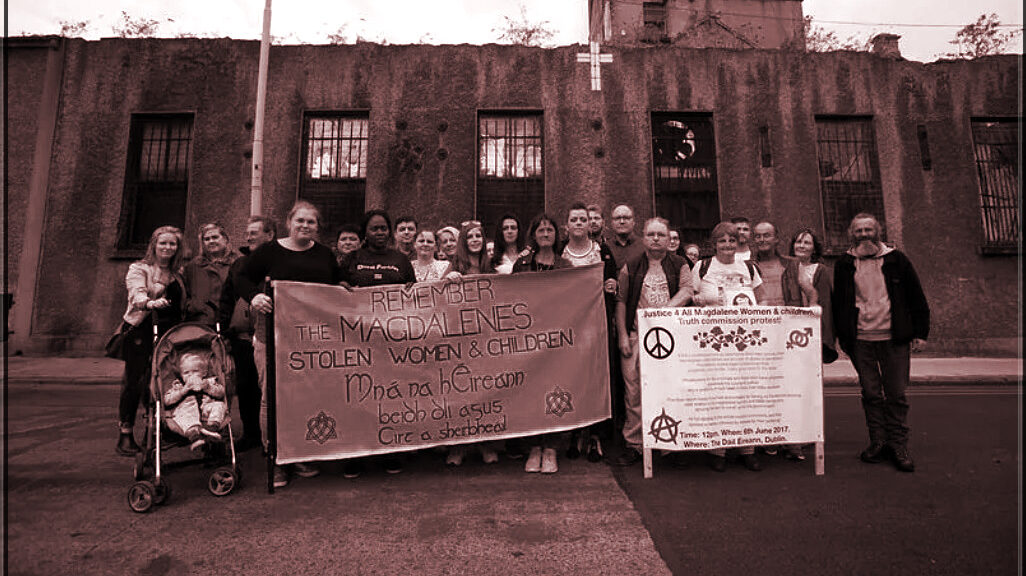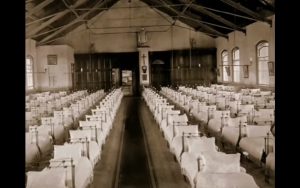Joni Mitchell Magdalene Laundries
Magdalene Asylums
September 26, 1996
The last Magdalene asylum, in Waterford, Ireland, closed
From the documentary: Sex In A Cold Climate The Magdalene Asylums
Joni Mitchell Magdalene Laundries
Double standards
Societies have double standards. One of the most prominent, yet most denied is the relationship between males and females. The French have their expression vive la différence regarding that relationship. Biologists have studied the quantitative chemical differences between the sexes, but those differences are not qualitative. There are no “female traits that are completely female nor “male” traits completely male.
We are all both to varying degrees.
As rationally as some can approach the reality, most humans continue to treat human males and human females as if they were different species and allow males to dominate females. Such a difference is particularly true with regard to sexual behavior. The sale and purchase of sex is illegal nearly everywhere, but societies typically punish the male buyer far less seriously and far less often than the female seller.
Joni Mitchell Magdalene Laundries
Magdalene Asylums
The Magdalene Asylums existed in the United Kingdom as a means to “rescue” prostitutes. No analogous institution existed to rescue males who regularly frequented prostitutes. The first “Magdalene Home” was established in England in 1758; Ireland followed in 1765. Both the Anglican and Presbyterian churches ran these so-called asylums, but the Catholic Church in Ireland is the most associated (keep in mind that at the time of their creation, Ireland was part of the UK). There were also Magdalene asylums in Canada and Australia.
Joni Mitchell Magdalene Laundries
Magdalene Laundries
With he Biblical maxim that “Idle hands are the devil’s workshop; idle lips are his mouthpiece” in mind, the mostly young women sent to these asylums found a day filled with work. If pregnant, the asylum forced the mother to give up the child, but young women were in the asylum often simply because her family or her parish priest thought the woman might attract male attentiveness or was flirtatious. Or perhaps the parish priest was guilty of that attentiveness and he removed his “near occasion of sin” by sending away the young woman.
Though called an asylum, in actuality the institution was a jail. Inmates had no choice to their being there and once there might be there for life. There had been no trial or due process. There were no visits from the outside world.
Their work was to do laundry (from the outside world) to earn money for the jail. Asylums may have signed contracts guaranteeing a minimum wage, but the institutions ignored that agreement. The women scrubbed the prison, cooked for the nuns who oversaw the prison, or took care of aging inmates.
During their existence research estimates that 30,000 women were in these institutions. In the theocratic Ireland, both the State and Church conspired to keep jail stories away from the public eye. The inmates’ stories seldom escaped because the inmates rarely left. The Sisters in charge warned those who did leave never to speak of their incarceration.
Joni Mitchell Magdalene Laundries
Abuse revealed
In Dublin in 1993 developers accidentally discovered 133 corpses in an unmarked grave site that had belonged to the Catholic Sisters of Charity. The Sister had sold the property that had once been part of a Magdalene laundry site. Slowly former inmates began to tell the story they’d held in for years or even decades.
In 2001, the Irish Government admitted that the Magdalene Laundries had been places of abuse and 2011 the United Nations Committee Against Torture urged Ireland to investigate the facts and truth of the government involvement.
A 2013, the Irish panel found evidence of verbal abuse, and Ireland’s Prime Minister Enda Kenny issued a full state apology to the victims, calling them the “nation’s shame”. He said, in part, “on behalf of the State, the government and our citizens [I] deeply regret and apologise unreservedly to all those women for the hurt that was done to them, and for any stigma they suffered, as a result of the time they spent in a Magdalene Laundry,”
Joni Mitchell Magdalene Laundries
Joni Mitchell
In 1994 Joni Mitchell released one of the most powerful songs she ever wrote and likely the most powerful song ever written about the Magdalene abuses.
I was an unmarried girl
I’d just turned twenty-seven
When they sent me to the sisters
For the way men looked at me
Branded as a Jezebel
I knew I was not bound for Heaven
I’d be cast in shame
Into the Magdalene laundries *
Most girls come here pregnant
Some by their own fathers
Bridget got that belly
By her parish priest
We’re trying to get things white as snow
All of us woe-begotten-daughters
In the steaming stains
Of the Magdalene laundries
Prostitutes and destitutes
And temptresses like me
Fallen women
Sentenced into dreamless drudgery
Why do they call this heartless place
Our Lady of Charity?
Oh charity!
These bloodless brides of Jesus
If they had just once glimpsed their groom
Then they’d know and they’d drop the stones
Concealed behind their rosaries
They wilt the grass they walk upon
They leech the light out of a room
They’d like to drive us down the drain
At the Magdalene laundries
Peg O’Connell died today
She was a cheeky girl
A flirt
They just stuffed her in a hole!
Surely to God you’d think at least some bells should ring!
One day I’m going to die here too
And they’ll plant me in the dirt
Like some lame bulb
That never blooms come any spring
Not any spring
No, not any spring
Not any spring
Joni Mitchell Magdalene Laundries
Sinéad O’Connor
On October 3, 1992 Irish singer Sinéad O’Connor used her Saturday Night Live appearance to make a statement about the Catholic Church’s conspiracy to cover up its history of child and sexual abuse by tearing up a photo of Pope John Paul II after her performance of Bob Marley’s “War.” She stated simply, “Fight the real enemy.”
The incident, not surprisingly, brought down upon her a mountain of indignation. In retrospect, her statement was a completely valid one. [a reader adds that O’Connor herself was incarcerated in one of the laundries. See comments]
Joni Mitchell Magdalene Laundries
Catholic League responds
In 2013, Bill Donohue published an article in the Catholic League entitled “The Myths of the Magdalene Laundries.”
Early in the long piece, Donohue states, “The popular perception of the laundries is entirely negative, owing in large part to fictionalized portrayals in the movies. The conventional wisdom has also been shaped by writers who have come to believe the worst about the Catholic Church, and by activists who have their own agenda. So strong is the prejudice that even when evidence to the contrary is presented, the bias continues.”
A blind apology in my eyes.




Should be noted Sinead O’Connor herself was incarcerated in one of the laundries.
Thank you for that additional information. So noted.
I have always wanted to know what O’Connor thought of Mitchell’s song Magdalene Laundries and I had hoped that Sinead would have recorded it, too.
Good point. Perhaps her picture-tearing on SNL was her Magdalene Laundry.